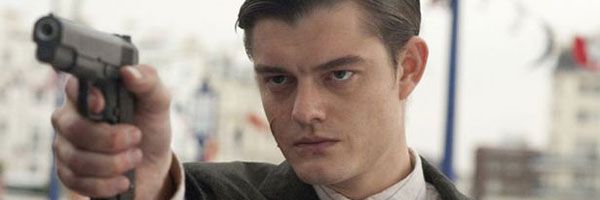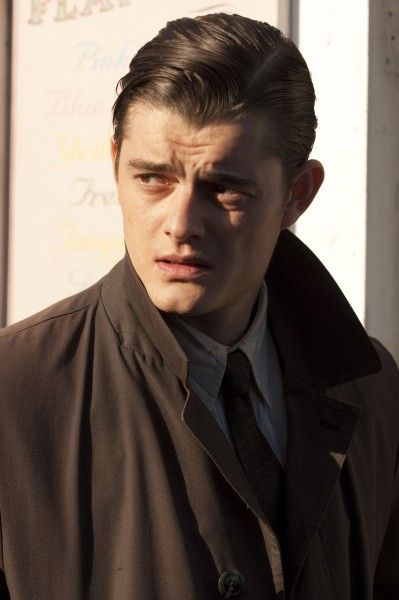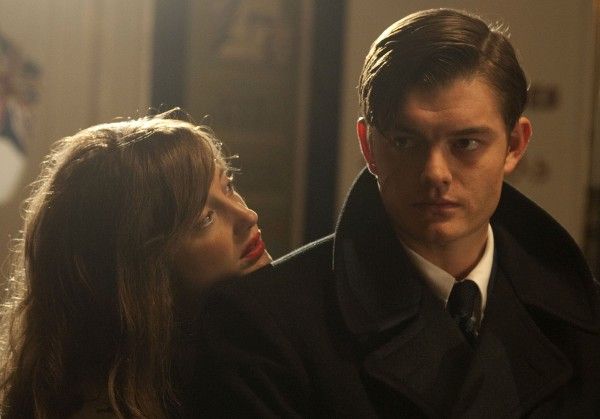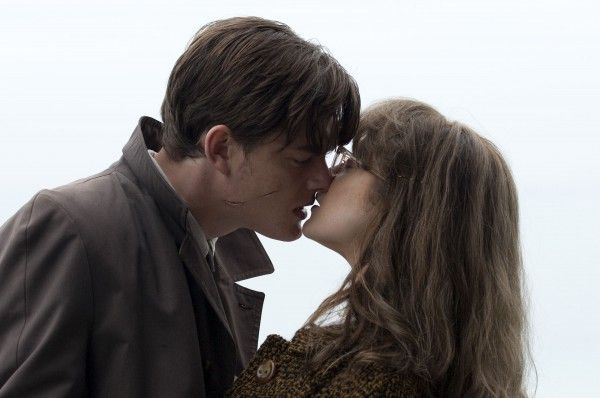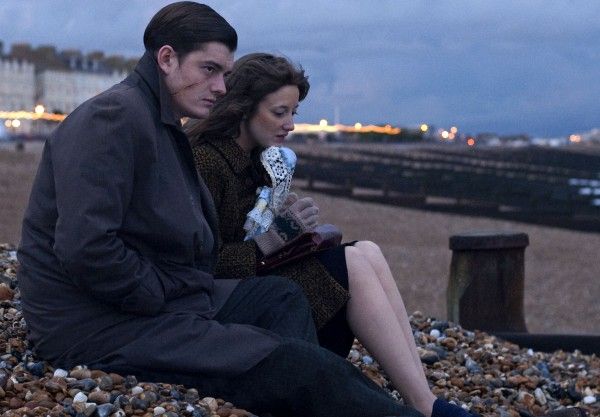Brighton Rock, the debut feature from screenwriter Rowan Joffe, tells the story of Pinkie Brown (Sam Riley), an ambitious young gangster who will stop at nothing to make a name for himself in Britain’s sinister world of organized crime. When Rose (Andrea Riseborough), a naive local waitress, stumbles upon evidence that links Pinkie to a revenge killing, Pinkie uses his cunning and charm to seduce Rose, in an attempt to keep his alibi, but becomes truly intrigued by her.
Set in the picturesque seaside resort of Brighton, England, the film updates Graham Greene’s iconic 1939 novel to 1964, at the height of the Mods and Rockers riots, and gives it a new feel and flare, while remaining true to the story itself. During a recent interview to promote the film’s limited release on August 26th, actor Sam Riley talked about what attracts him to dark characters, how he feels the change in setting to the ‘60s allowed them to explore ideas that the original wasn’t able to, how happy he was to get to wear such great suits, and how working with such a great cast led to him having one of the most pleasurable working experiences he’s ever had. He also talked about the experience of making On The Road (co-starring Garrett Hedlund, Kristen Stewart and Kirsten Dunst), getting himself in shape for the role and working with a dialect coach every day. Check out what he had to say after the jump:
Question: What is it about these dark characters, like Pinkie Brown (in Brighton Rock) or Ian Curtis (in Control), that attracts you?
SAM RILEY: Well, if everything is one-dimensional, or just nice, or just sensitive, then it’s not very realistic, is it? I think they are dark, but I always find something likeable in them. Maybe it’s my face. Maybe I’ve just got one of those faces that looks miserable.
Having been familiar with this book, how did you feel about the setting being changed, and what do you think that adds to this version of the story?
RILEY: At first, I was a little bit skeptical, but (writer/director) Rowan [Joffe] had the right ideas. I think Rowan wanted to explore more of the darker things that the censorship rules in the days of the Boulting brothers’ movie wouldn’t allow them to explore the same way. To move it to the ‘60s still keeps it within a time frame where there was the death penalty, which is important to the plot. The idea of a youth revolution was going on at the time, and it also plays a part in this story, with the boy of the gang is trying to take control of things. Also, people were still naive enough, in those days. They don’t make girls like Rose (Andrea Riseborough) anymore. A girl of her age would already have experienced rather a lot more, these days, one imagines. I don’t know whether it improves on anything, or if it just makes it its own thing. And, I was happy because I got to wear great suits.
What did you learn from watching and working with actors like Helen Mirren, John Hurt and Andy Serkis?
RILEY: Yeah, absolutely. That’s how I’m doing my learning. I’m not formally trained, really. When you’re actually doing a scene with somebody like that, you’ve got your eye on the ball. You don’t think, for a second, that it’s Helen Mirren or John Hurt or Andy Serkis. You’re in the moment. It’s when you go home at night that you think, “Fuckin’ hell, I just slashed John Hurt across the face today,” and then it hits you. I dream of having a career like those three – to always be able to do work and be in different things. A lot of that doesn’t only come from their talent on screen, it also comes from the way they carry themselves in life. You watch them when they come into the make-up trailer and see how they talk to the make-up people, or the costume people. They know what they’re doing. They know their shit. That’s why they’re so good. They’re always thinking, and that’s why they’re as good as they are. You watch and try to soak it up, and hope that some of it rubs off on you.
What did you personally take away from the experience of making Brighton Rock?
RILEY: I don’t know. It was certainly one of the most pleasurable experiences I’ve ever had, working in any form – to work with such great people. The crew were lovely. The English seaside is a fantastic place to shoot. I couldn’t say what I’ve learned, but I’m hopefully going to take away what I did learn and what good things I did, and remember them for the next time.
Is it difficult for you, as an actor, to do these smaller independent films because you love the character or story, but not have very many people see them?
RILEY: That’s life, as my wife told me. My first film went to Cannes, everyone blew smoke up my ass, and I won some prizes and things, but it’s never going to be like that, for the rest of my life. I’m not stupid. But, I went to America and did a film, called 13, with Mickey Rourke and Ray Winstone. I hoped that it was going to at least come out, which it never even did, in the end. That’s a bit hard to take, but it’s not unusual. My very first experience in a cinema film, I played a bit part. I took seven friends to the cinema, and they’d cut me out without telling me. That’s a classic embarrassing actor story. In the life of an actor searching for work, you quite often get told that you’ve got the wrong face, you’re too tall, you’re not good enough, or someone is more famous and therefore is going to get bums on seats. If you read something you think is great and you want to do it, but they tell you that you can’t, you can’t sit around at home, moping about it. You have to just think, “All right, fuck you then. Next.”
What do you do, in those times, to clear your head?
RILEY: I’m trying to do more exercise. I write as well, and I still play my guitar. I’m working on my magnum opus. It’s a post-apocalyptic movie, set in Leeds. And, I’m writing short films and things. I don’t know whether I’m ever going to do anything with it, but it keeps me busy. I also watch a lot of films. I watch all the classic films that film people say that you ought to have seen, and I try to watch things in the cinema when they come out, just to keep my eye on the competition. I’m bored when I’m not working.
What was the experience of making On The Road like? How did you prepare for a role like that?
RILEY: That was probably the most I’ve had to prepare for something because there’s an awful lot of expectation riding on that. Preparation wise, I’m a pasty, very skinny, Englishman, and I was going to be playing a sporty American, so the first thing I had to do was get a personal trainer and whip myself up into shape, in a very short amount of time, unfortunately. It came out of nowhere. I was going to do it two and a half years ago, and then it ran out of money, so I thought I was just on the list of other actors that nearly played the role, and I was quite happy with that, to be honest, because it’s a great list. I wouldn’t have had to go through the humiliation of getting it wrong. But, I had dialect coaching every day, for two months before shooting and throughout as well. I had a lot of tapes of his voice, not to mimic him, but to have the essence of it, and certainly to not sound British, in any way. I learned to speak French-Canadian with a Quebecois accent, and I learned how to use a typewriter. Fortunately, I can smoke, which he was very good at, as well.

